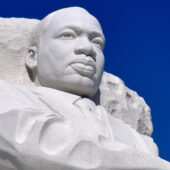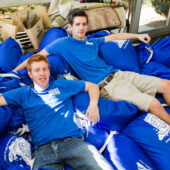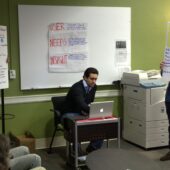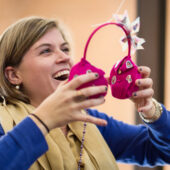Building on MLK’s dream
 Nancy Aguillon, a Wake Forest senior, and Harold Holmes, associate vice president and dean of student services at Wake Forest, were recognized as this year’s Martin Luther King Building the Dream Award winners. The MLK Dream Award recognizes those who exemplify King’s qualities and promote diversity within the community.
Nancy Aguillon, a Wake Forest senior, and Harold Holmes, associate vice president and dean of student services at Wake Forest, were recognized as this year’s Martin Luther King Building the Dream Award winners. The MLK Dream Award recognizes those who exemplify King’s qualities and promote diversity within the community.
Categories: Campus Life, Community Impact, Experiential Learning, Happening at Wake, University Announcements

 It could be the motto that we hold so dear: Pro Humanitate. Or the enviably low student-teacher ratio of 11 to 1. Or the teacher-scholar tradition that our faculty embraces. Whatever the reason, mentoring at Wake Forest goes to a whole new level. Read some of the best stories from 2012.
It could be the motto that we hold so dear: Pro Humanitate. Or the enviably low student-teacher ratio of 11 to 1. Or the teacher-scholar tradition that our faculty embraces. Whatever the reason, mentoring at Wake Forest goes to a whole new level. Read some of the best stories from 2012. Many of the University's long-standing campus traditions began with student inspiration -- and there's always room for new ideas. Throughout the academic year, students, faculty and staff support each other in leadership, service, fellowship and fun.
Many of the University's long-standing campus traditions began with student inspiration -- and there's always room for new ideas. Throughout the academic year, students, faculty and staff support each other in leadership, service, fellowship and fun. Wake Forest students come from a wide range of backgrounds, and each has unique experience in the University's liberal arts setting. From service trips, to studying abroad, to campus traditions, these student storytellers present a personal view of what it means to be a Wake Forester.
Wake Forest students come from a wide range of backgrounds, and each has unique experience in the University's liberal arts setting. From service trips, to studying abroad, to campus traditions, these student storytellers present a personal view of what it means to be a Wake Forester. Entrepreneurship and social enterprise is Wake Forest's largest and fastest-growing minor. From students starting their own companies, to developing organizations that help others, the entrepreneurial spark is strong on campus. Here are some of this year's entrepreneurship highlights.
Entrepreneurship and social enterprise is Wake Forest's largest and fastest-growing minor. From students starting their own companies, to developing organizations that help others, the entrepreneurial spark is strong on campus. Here are some of this year's entrepreneurship highlights. Regardless of major or concentration, writing skills are crucial for college students. The Writing Center at Wake Forest offers all students tutoring from their peers with the goal of creating a lifelong facility for personal and professional communication.
Regardless of major or concentration, writing skills are crucial for college students. The Writing Center at Wake Forest offers all students tutoring from their peers with the goal of creating a lifelong facility for personal and professional communication. In the quest to build a better mousetrap, the usual approach would include schematics, engineering and experimentation – generally following the scientific method. But if you put on your “design thinking” cap, you might ponder these questions: What attracts mice? Is catching them the solution?
In the quest to build a better mousetrap, the usual approach would include schematics, engineering and experimentation – generally following the scientific method. But if you put on your “design thinking” cap, you might ponder these questions: What attracts mice? Is catching them the solution? Historically, Wake Forest undergrads pass in and out of the Z. Smith Reynolds Library nearly 25,000 times during exam week. To help with the long hours and anxiety of final tests and papers, the community comes together to offer students some welcome breaks.
Historically, Wake Forest undergrads pass in and out of the Z. Smith Reynolds Library nearly 25,000 times during exam week. To help with the long hours and anxiety of final tests and papers, the community comes together to offer students some welcome breaks. For most students, a Friday night in December means studying for the next week’s exams, with maybe some social time to celebrate the last week of classes. Instead of getting ready for the library or a party, 16 juniors and seniors spent a recent evening preparing themselves for life after college.
For most students, a Friday night in December means studying for the next week’s exams, with maybe some social time to celebrate the last week of classes. Instead of getting ready for the library or a party, 16 juniors and seniors spent a recent evening preparing themselves for life after college. An entrepreneurship course challenges students to consider their ideas on both community and global levels to design ideas and prototypes which could have a significant impact for differently resourced areas of the world.
An entrepreneurship course challenges students to consider their ideas on both community and global levels to design ideas and prototypes which could have a significant impact for differently resourced areas of the world.